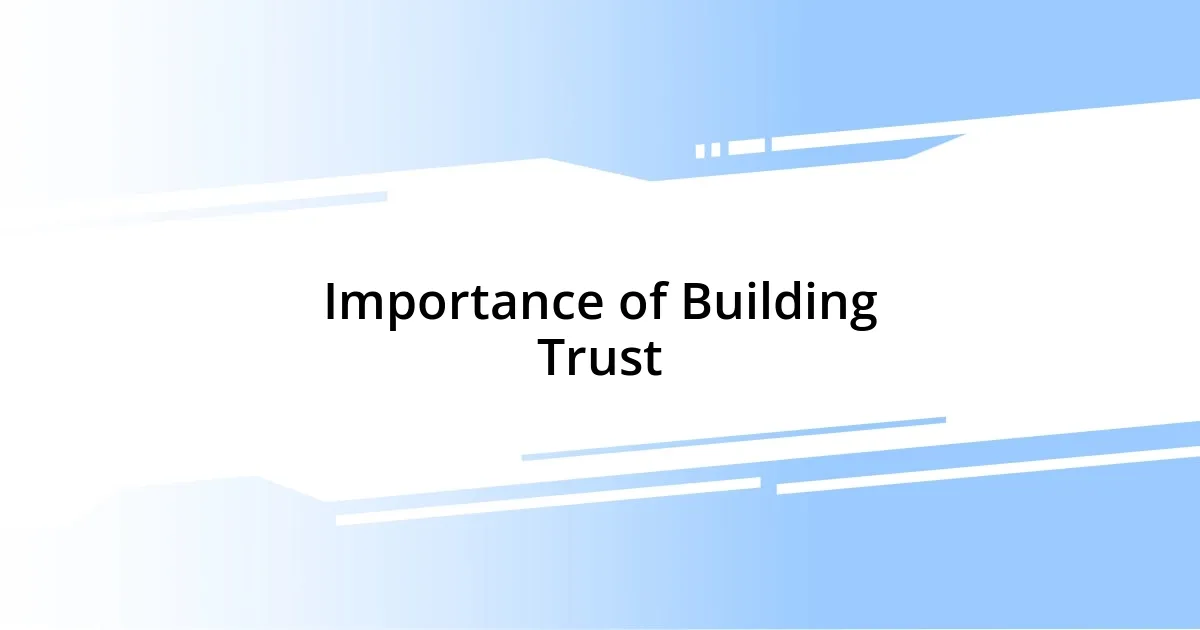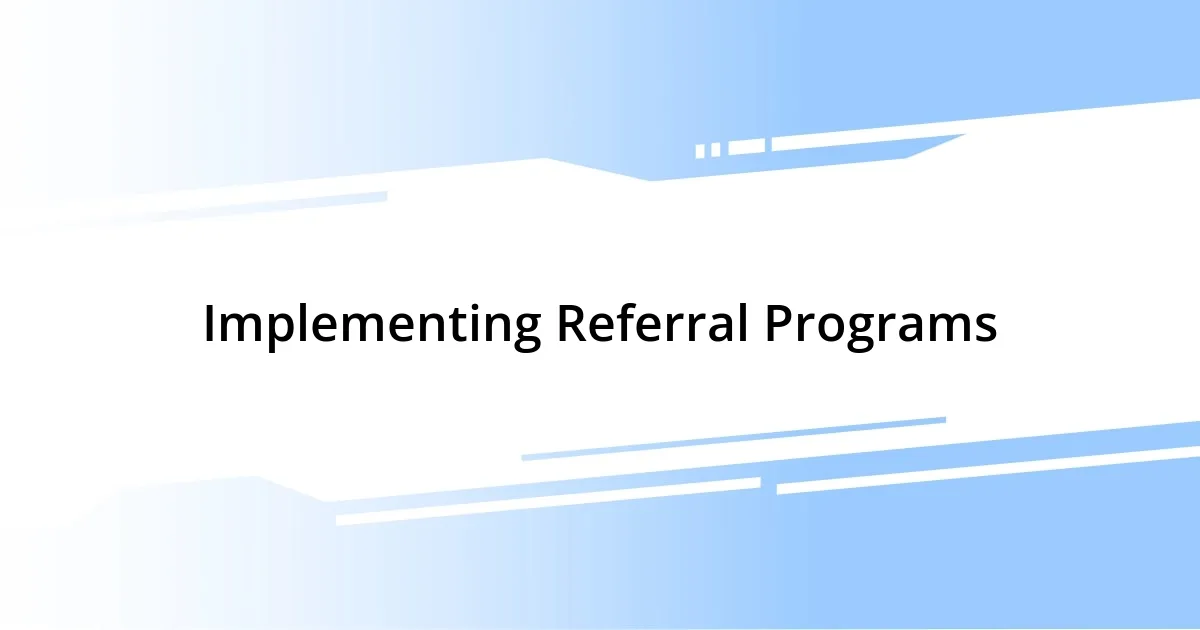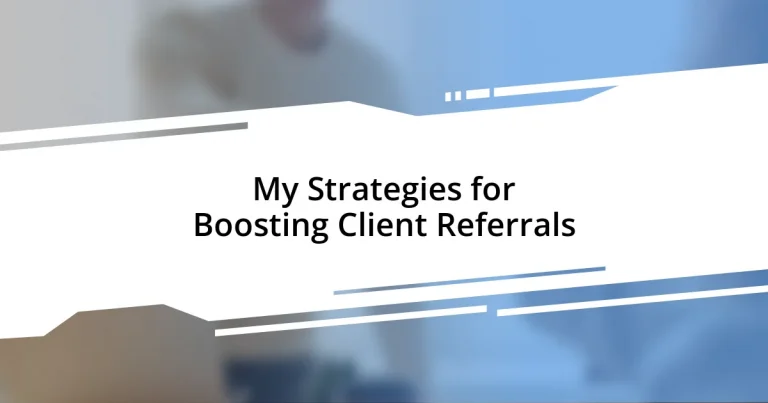Key takeaways:
- Client referrals are driven by trust, satisfaction, and strong emotional connections, turning clients into advocates.
- Building trust through consistent communication, honesty, and responsiveness significantly enhances client loyalty and referral potential.
- Creating excellent client experiences, with personalized services and thoughtful follow-ups, fosters deeper relationships that encourage referrals.
- Implementing and measuring structured referral programs can significantly boost referrals and provide insights into client satisfaction and value.

Understanding Client Referrals
Understanding client referrals is about recognizing their true value. I remember a time when a satisfied client referred me to a colleague, and that single connection led to a long-term partnership. It struck me then just how powerful word-of-mouth can be—after all, who doesn’t trust a recommendation from a friend or trusted source?
When clients refer others, it often stems from a strong emotional connection. I’ve seen firsthand that clients are more inclined to recommend services when they feel valued and understood. This raises an interesting question: how well do we know our clients? Establishing genuine relationships can transform one-time customers into passionate advocates for our business.
It’s essential to appreciate that referrals are not just random recommendations; they signify trust and satisfaction. I once had a client express gratitude for the extra effort I put into a project, and that appreciation turned into referrals to other businesses within their network. It’s this sort of affirmation that solidifies the importance of nurturing client relationships, as the ripple effect of a single referral can be profound.

Importance of Building Trust
Building trust is fundamental in any client relationship. I recall a time when a client was hesitant to engage further because they had previously experienced poor communication with another service provider. By being transparent and delivering on my promises consistently, that slowly transformed our interaction. Eventually, that client not only continued using my services but also referred their entire team to me. It highlighted for me that trust isn’t built overnight—it’s a journey paved with reliability and integrity.
Furthermore, trust amplifies the value of feedback. When clients believe in your commitment to them, they’re more likely to share honest opinions about your services. I remember receiving constructive criticism from a longtime client, which I took to heart. This feedback not only improved my offerings but also deepened our relationship. That sense of loyalty often results in clients feeling more comfortable recommending you to others.
Ultimately, trust allows for open conversation, fostering an environment where clients feel safe to voice their needs and expectations. I’ve found that when clients trust you, they become advocates, ready to share their positive experiences with others. This kind of organic growth is not just beneficial; it’s vital in today’s competitive marketplace, where building connections is the key to sustained success.
| Trust Building Actions | Impact on Client Referrals |
|---|---|
| Consistent Communication | Increases confidence in service delivery |
| Honesty in Challenges | Strengthens loyalty and rapport |
| Responsive Support | Encourages positive word-of-mouth |

Creating Excellent Client Experience
Creating a remarkable client experience is all about the little things that make clients feel appreciated and understood. I had a client once who mentioned how overwhelmed they felt with their workload. I took a moment to listen and offered personalized resources that could lighten their load. Seeing their relief and gratitude opened my eyes to how meaningful a tailored approach can be. Clients remember these gestures, and they often share these positive experiences with others, leading to more referrals.
To ensure an excellent client experience, consider these strategies:
- Personalization: Tailor your services to meet individual client needs, showing them they are valued.
- Proactive Communication: Regularly check in with clients to anticipate their needs and demonstrate your commitment.
- Follow-Up: After completing a project, I always reach out to ask for feedback. It shows I care and helps improve my services.
- Surprise and Delight: Occasionally, I send a small thank-you gift or handwritten note, which leaves a lasting impression.
- Exceed Expectations: When a deadline is approaching, I make an effort to deliver a day or two early. This often leads to clients feeling pleasantly surprised and eager to spread the word.
Integrating these small actions can foster a deeper connection with clients, encouraging them to become enthusiastic advocates for your business.

Implementing Referral Programs
Implementing a referral program can be a game changer for any business. I remember the excitement I felt when I first rolled out a structured referral initiative. It was straightforward: for every referral they brought in, clients received a discount on their next invoice. This simplicity not only encouraged clients to share my services with their network but also made them feel directly invested in my success.
To truly make a referral program effective, it’s crucial to communicate its benefits clearly. I often share stories about how previous referrals have positively impacted my business and helped other clients achieve their goals. This not only builds excitement but also showcases the tangible results of referrals, sparking clients’ interest in participating. Have you ever wondered how a simple nudge can motivate someone to advocate for you? I’ve seen firsthand how quickly enthusiasm can propagate when clients understand the value they’re adding through their referrals.
Another key aspect is to make the referral process easy and hassle-free. On my website, I created a dedicated referral page where clients can easily submit their recommendations with just a click. I was amazed when I noticed the increase in referrals; clients appreciated the convenience and didn’t feel overwhelmed. For me, this experience reinforced that when clients feel empowered and appreciated, they’re more likely to lend their voices to support you.

Utilizing Social Proof Effectively
Utilizing social proof is one of the most powerful strategies I’ve come across for boosting client referrals. For instance, whenever a client shares a positive testimonial, I ensure that it is prominently featured on my website and social media. The excitement I feel when a potential client mentions they saw a review fuels my motivation—it’s like a glowing recommendation waiting to be shared. Have you ever wondered why we often trust the opinions of others more than marketing slogans? This is the essence of social proof.
When clients see reviews and success stories from others, they feel more confident in referring my services. I once shared a short video of a client discussing how my work transformed their business. It was heartwarming to see their passion shine through, and I noticed a spike in inquiries after I posted it. That personal touch, alongside authentic narratives, creates a sense of trust that written words alone often lack. It not only highlights my expertise but also showcases the real-world impact of collaboration.
To truly harness social proof, I recommend actively seeking feedback and then sharing those insights. After completing a project, I sometimes ask clients for a quick video testimonial. There’s something incredibly special about hearing a client’s story through their own voice. I remember receiving a glowing testimonial that described how I helped them navigate a tough market. I felt honored and motivated, knowing their success story could inspire others. It’s fascinating how sharing others’ experiences can create a ripple effect, encouraging new clients to reach out. Are you leveraging your client stories in this way? If not, now’s the time to start!

Engaging Clients Through Follow-ups
Follow-ups can truly bridge the gap between a one-time client and a loyal advocate. I often reach out after finishing a project, simply to ask how they’re doing and if they need any further assistance. This personal touch not only shows that I care, but it also opens the door for more conversations—and potentially future referrals. Have you ever noticed how a simple check-in can revive a relationship? It’s amazing how a few thoughtful words can keep you top of mind.
Moreover, I’ve found that timing is everything. A few weeks after delivering a project, I send a follow-up email that includes an invitation for feedback. This not only encourages clients to reflect on their experience but also gives them a chance to express any concerns. One time, a client mentioned a small issue that I immediately addressed. They were so pleased with my prompt response that they ended up referring me to two new clients shortly after! It’s moments like this that highlight the importance of engagement—people appreciate when they feel heard.
Another strategy I employ is to share valuable resources in my follow-ups. Whether it’s an article, a tip relevant to their business, or an upcoming event I think they might enjoy, I find that offering extra value reinforces my role as a trusted advisor. I remember when I shared a webinar about industry trends with a previous client; they reached out to thank me and shared it with their network, which led to three referrals. It’s a win-win: clients benefit from the added information, and I keep the lines of communication open to foster deeper relationships. Don’t you think being proactive in nurturing these connections can significantly impact your referral potential?

Measuring Referral Program Success
Measuring the success of a referral program is vital for understanding its true impact on my business. I often track the number of referrals generated over a specific period and the conversion rates of those referrals. It’s rewarding to see how a small, consistent effort results in tangible growth. Have you ever realized how one satisfied client can lead to a chain reaction? Each successful referral is a testament to the relationships I’ve built.
Another key metric I focus on is the average value of referrals. By analyzing the revenue generated from referred clients compared to non-referred ones, I gain invaluable insights into the quality of referrals. I recall a time when I discovered that my referrals typically spent 30% more than other clients. It truly astonished me and underscored the critical role that trust plays in these connections. Doesn’t it make you think about the return on investment of nurturing a robust client relationship?
Additionally, I utilize client feedback surveys to gain qualitative insights into the referral process. This practice allows me to understand clients’ motivations for referring my services, enabling me to tailor my approach further. I remember one client shared that the reason they referred me was due to my attentive service and personalized approach. This emotional connection reinforced my belief in providing excellent experiences, driving home the idea that happy clients are more likely to advocate for my work. Isn’t it fascinating how a simple conversation can reveal so much?













